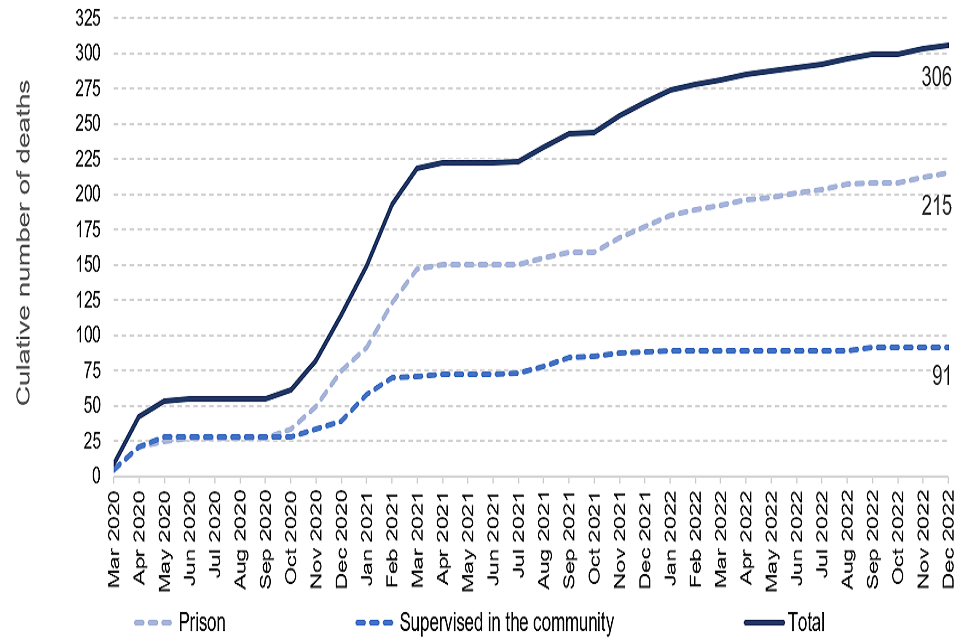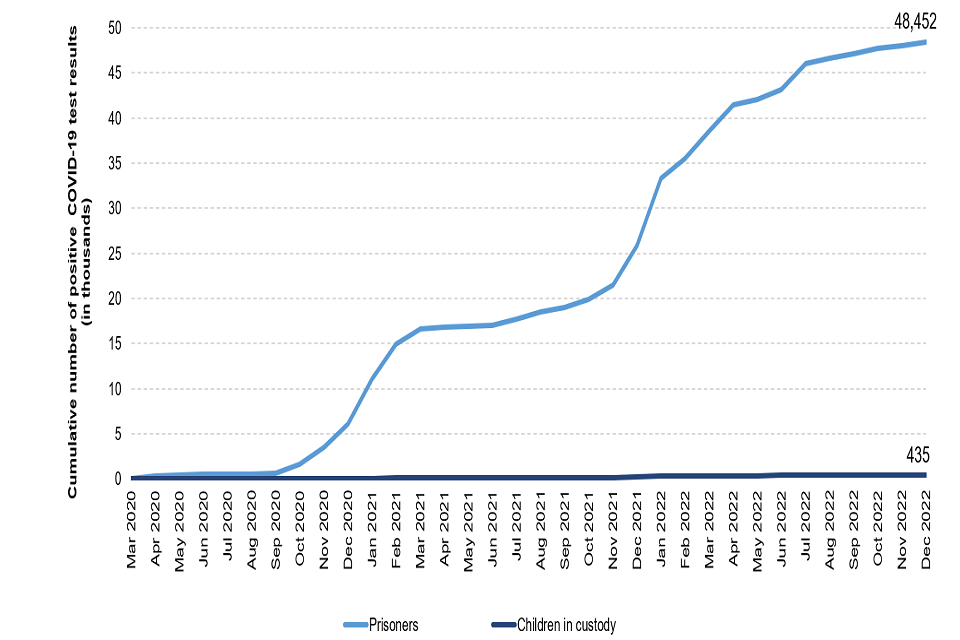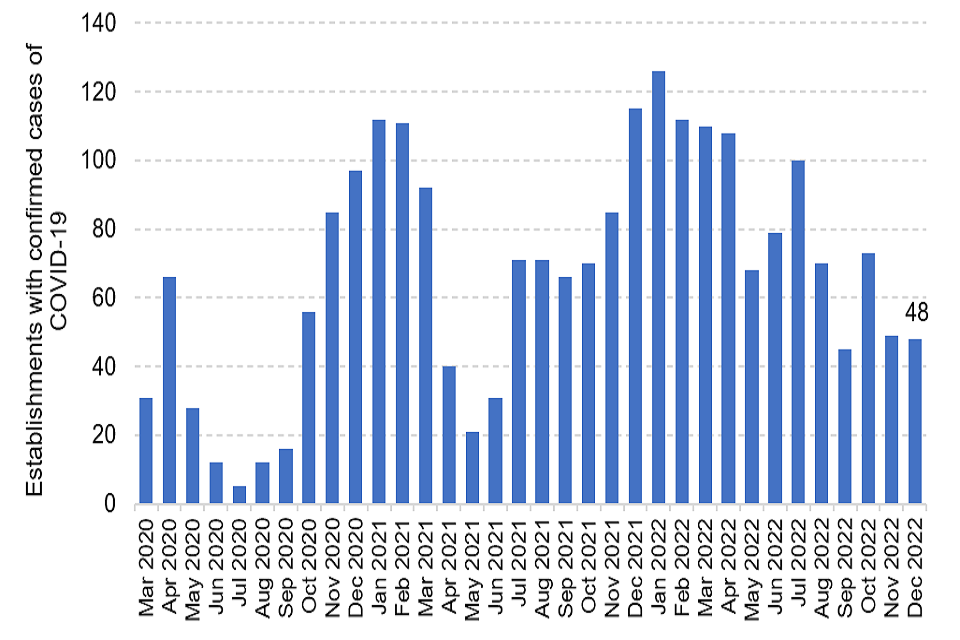HM Prison and Probation Service COVID-19 Statistics, December 2022
Published 20 January 2023
Introduction
This official statistics release provides monthly data on the spread of COVID-19 in the prison and probation service in England and Wales and mitigating actions being taken to limit the spread of the virus and save lives. This release covers the period from Monday 16 March 2020 at the start of the COVID-19 outbreak to 5 January 2023 [footnote 1].
It provides information on:
-
Deaths where prisoners, children in custody or supervised individuals have died having tested positive within 60 days, in England and Wales, of the death or where there was a clinical assessment COVID-19 was a contributory factor in their death regardless of cause of death.
-
Prisoners and children in custody who have had a confirmed case of COVID-19 (i.e. positive tests).
-
Narrative on capacity management data for prisons.
Key Findings
The key findings in this release are:
-
306 prisoners and supervised individuals have died having tested positive within 60 days of death or where there was a clinical assessment COVID-19 was a contributory factor in their death. Of whom 215 were prisoners and 91 were individuals supervised by the probation service. There were 3 deaths in November 2022. There have been no deaths of children in custody.
-
Of the 306 deaths, 243 were suspected or confirmed to be caused by COVID-19, of whom 160 were prisoners and 83 were supervised individuals. Of the 32 deaths since February 2022, 9 are suspected or confirmed to be due to COVID-19.
-
48,887 prisoners or children in custody have tested positive for COVID-19 since the start of the pandemic, across 130 establishments, almost all of whom were adults.
-
There were 436 new confirmed cases in December 2022, this is 148 more than in November 2022.
-
48 establishments had prisoners testing positive in December 2022, a decrease of 1 compared with November 2022.
Background
Since the start of the COVID-19 pandemic, there has been keen public and Parliamentary interest in how the Ministry of Justice (MOJ) and His Majesty’s Prison and Probation Service (HMPPS) are managing the running of prisons and the probation system to limit the spread of the virus while maintaining the core functions of these vital parts of the justice system. Publishing this data aims to bring transparency to the strategies HMPPS is employing to manage the prison and probation systems, as well as the impact of the virus on the individuals in the care of HMPPS and staff.
The core tenet of HMPPS’s prison strategy, building on UK Health Security Agency (UKHSA) advice and learning developed in managing an early outbreak of the virus, was the implementation of effective isolation, reverse cohorting of new entrants to custody, and shielding of vulnerable prisoners. In May 2022, COVID-19 Gold command was stood down, and as part of the ‘Living with COVID’ government strategy, many of these central controls shifted from centrally directed to local decision making in response to remaining COVID risk. Prisoners who had previously been shielding have been invited to complete Personal Management Plans as a more permanent response to their ongoing risk.
Asymptomatic testing ceased on 31 August in England and 8 September in Wales. Symptomatic testing and testing to return to work or return to regime continues. Increased testing guidance remains available and may be reintroduced in response to local risk. HMPPS continue to support the rollout of vaccinations by Healthcare teams to the prison population. Information is available in establishments for Winter vaccination programs both for COVID-19 and influenza.
1. Capacity management
The prison population has started to increase and is nearing pre-Covid levels. The remand population has also increased since the start of the pandemic. This is in part due to the challenges in holding Crown Court trials and part due to the Criminal Bar Association strike. The remand population on 30 September 2022 was at its highest level for at least 50 years [footnote 2].
On 6 June 2022, the HMPPS Compartmentalisation and Protective Isolation Policy Framework was published on gov.uk and made available on the exceptional delivery platform. It replaced all previous cohorting and compartmentalisation guidance and provided the estate with an interim policy framework. Symptomatic prisoners and those who have returned a positive test result are required to isolate until symptoms subside or they test negative. These measures continue to minimise the risk of infection spreading throughout prisons.
The capacity management approach is being kept under ongoing review and regularly adapted in response to operational learning as well as evolving pandemic risks in the community. There is a balance between effective infection control and maintaining a commitment to support prisoners through their custodial sentence and help them access appropriate services.
The Personal Management Plan guidance for prisoners has been refreshed and published, and sites have been asked to establish minimum and maximum test kit stock levels, to prepare for response to a suspected or confirmed outbreak. Sites have enough test kits for each member of staff to test if needed to confirm a positive case or return to work.
2. Deaths
The service has taken the measures outlined to limit the spread of the virus and to protect staff and individuals in the care of HMPPS. However, prisons and probation, like all other sectors in the England in Wales have experienced deaths due to COVID-19.
The counting of deaths in prisons and probation are aligned to the UK Health Security Agency definition, and reports on deaths where the individual had tested positive for COVID-19 or where there was a clinical assessment that COVID-19 was a contributory factor in their death. This consists of:
-
Deaths suspected or confirmed to be due to COVID-19
-
Deaths believed to be due to other causes, but where the individual had tested positive for COVID-19.
From March 2020 to the beginning of January 2023, 306 individuals died in the care of HMPPS having tested positive for COVID-19 within 60 days of death or where it was confirmed post-mortem as a contributing factor. 215 of the 306 individuals were prisoners. There were no deaths of children in custody. 91 of the 306 individuals who died were being supervised in the community [footnote 3]. Two deaths in the community occurred in September 2022 and are the first deaths reported of individuals supervised in the community since January 2022.
Figure 1: Cumulative number of individuals in the care of HMPPS in prison and supervised in the community who have died testing positive within 60 days of the death or where it was confirmed post-mortem, England and Wales, monthly from March 2020 (Source: Summary Tables, Table 1)

55 deaths occurred before July 2020, 167 deaths between October 2020 and April 2021 and 84 deaths since July 2021. Of these 84 deaths, 7 have been since October 2022. There were 3 deaths in December 2022.
Of the 215 prisoner deaths, 160 are suspected or confirmed to be due to COVID-19. The remaining 55 deaths are believed to be due to other causes, although the individuals had tested positive for COVID-19. Of the 91 individuals under probation supervision who have died, 83 are suspected or confirmed to be due to COVID-19 with the remaining 8 believed to be due to other causes, but where the individual has tested positive for COVID-19.
The cause of death in each case is provisional until the official cause of death has been determined by the coroner. As such revisions may be made to the data as part of this process.
Data relating to the deaths of prison and probation officers to 31 July 2022 have been published in the HMPPS Workforce Statistics. This is the most recent data available as COVID-19 Statistics are no longer produced for this publication. Data relating to the deaths of service users have also been published in the National Statistics report Safety in Custody and in the official statistics report Deaths of Offenders in the Community.
3. Testing
Throughout the pandemic HMPPS has been working closely with the Department of Health and Social Care, the NHS, and public health colleagues in England and Wales in determining the appropriate COVID-19 testing regime and providing access to test kits. The testing regime has varied as testing capacity and policy changed in response to the risks presented. Mass testing of prisoners and staff has on occasions been undertaken at sites in outbreak following the recommendations of the public health led Outbreak Control Teams. Consequently, COVID-19 testing practices in prisons and Youth Custody Service (YCS) sites have varied considerably throughout the pandemic. Data trends should be considered with caution and do not represent true like-for-like comparisons over time.
Since the start of the COVID-19 pandemic to 5 January 2023, a cumulative total of 48,887 [footnote 4] prisoners or children in custody tested positive for COVID-19 across 130 establishments Less than 1% (435) of these positive tests were children. There were 436 new confirmed cases in December 2022, this is 148 more new cases than occurred in November 2022. Figure 2 shows the cumulative monthly individuals testing positive for COVID-19 to the end of December 2022.
Figure 2: Cumulative number of prisoners and children in custody testing positive for COVID-19, England and Wales, monthly from March 2020 (Source: Summary Tables, Table 2).

48 establishments had prisoners or children testing positive during December 2022, a decrease of 1 compared with November 2022. Figure 3 shows the number of establishments with prisoners or children testing positive each month since March 2020.
Figure 3: Number of Prison or Youth Custody Service establishments with prisoners or children in custody testing positive for COVID-19, England and Wales, monthly from March 2020 (Source: Summary Tables, Table 2).

Data Quality
Although care is taken when processing and analysing the returns, the detail collected is subject to the inaccuracies inherent in any large-scale recording system. Any inaccuracies may result in revisions of previously published information in future releases. Much of the data collected during the COVID-19 pandemic has been done at pace, with recording practices evolving as we understand more about the requirements and conditions we are facing. In order to present the timeliest information, the data presented in this report have not been subjected to the usual standard of quality assurance associated with official statistics.
Much of the data will undergo additional assurance in due course and be reported as official statistics in the following releases:
All deaths are phoned into MOJ headquarters on a daily basis. The cause of deaths in prison are classified as apparent until a police investigation and coroner’s inquest have been concluded and the Prisons and Probation Ombudsman’s office publish a detailed ‘Fatal Incident Report’. Recording practices for COVID-19 related deaths have been updated since the start of the pandemic, meaning the exact cause is not always available or known. Furthermore, the cause of many deaths will be uncertain and awaiting an inquest; we have taken steps to reflect this uncertainty by reporting all cases in which COVID-19 was suspected to be a factor.
Contact points
Press enquiries should be directed to the Ministry of Justice press office:
Email: PressOfficePrisonsDesk@justice.gov.uk
Tel: 020 3334 3536
Other enquiries about these statistics should be directed to:
Ed Rowland
Email: PPRWS_Correspondence@justice.gov.uk
Next update: 10 February 2023
© Crown copyright
Produced by the Ministry of Justice
Alternative formats are available on request from PPRWS_Correspondence@justice.gov.uk
-
Testing data is up to 5 January 2023 as that was the first working day that included all of December 2022 testing data. ↩
-
Statisticians Comment can be found at https://www.gov.uk/government/statistics/offender-management-statistics-quarterly-april-to-june-2022/offender-management-statistics-quarterly-april-to-june-2022 ↩
-
On the 26 June 2021 the National Probation Service was renamed the Probation Service and took on responsibility for supervising low and medium risk offenders previously managed by Community and Rehabilitation Companies. ↩
-
This number includes prisoners or children in custody that may have contracted COVID-19 more than once. ↩
